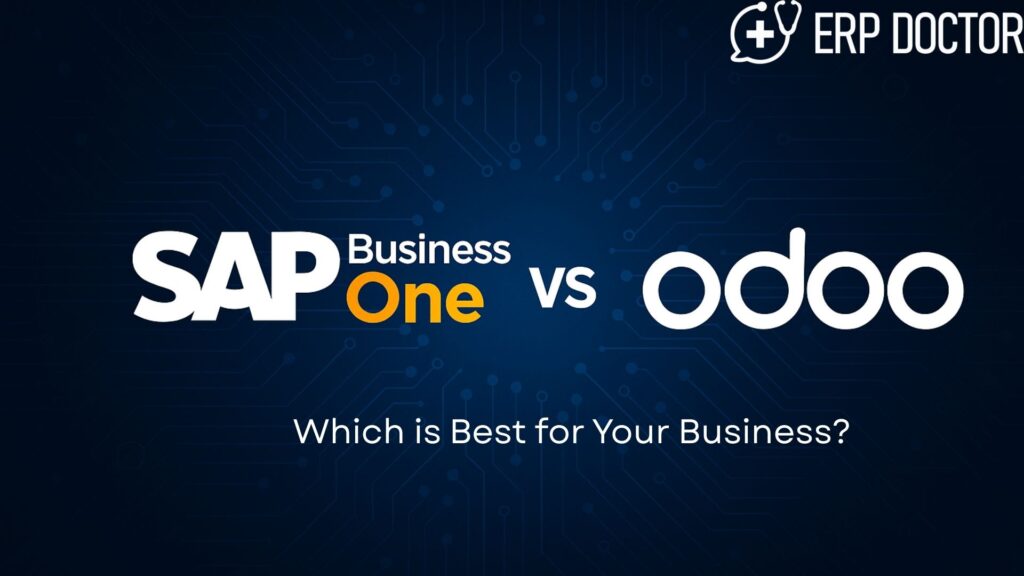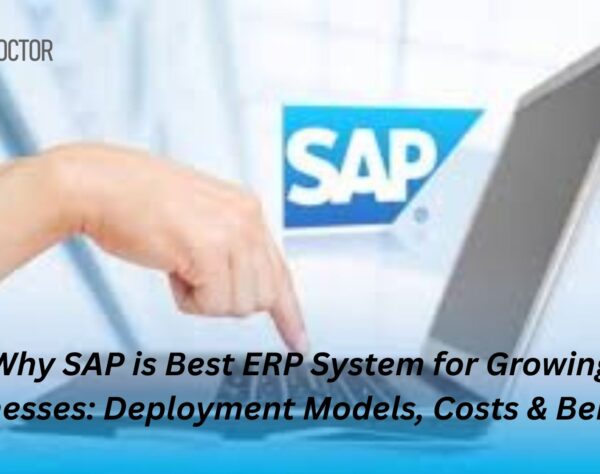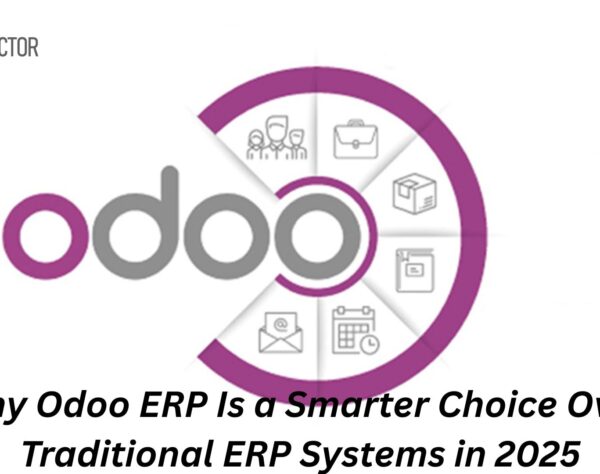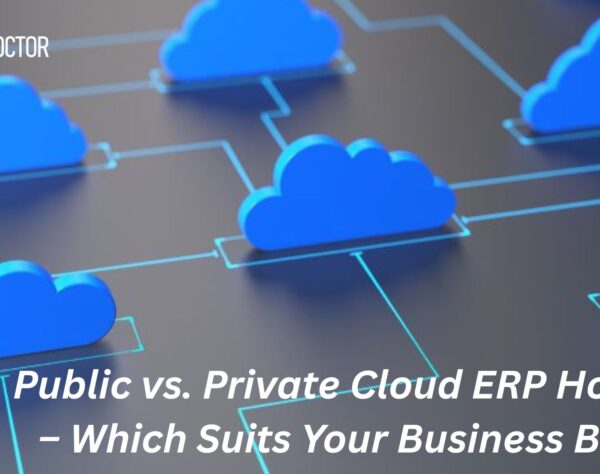
SAP Business One vs Odoo: Which is Best for Your Business?

SAP B1 vs Odoo: Choosing the Right ERP for Your Business
When it comes to choosing an ERP system, businesses have many options, but two of the most popular solutions are SAP Business One (SAP B1) and Odoo. Both systems offer comprehensive features designed to streamline business operations, but they differ in terms of pricing, scalability, functionality, and suitability for different types of businesses. This blog will compare SAP Business One and Odoo in detail, helping you determine which ERP solution is best suited for your business needs.
What Is SAP Business One?
SAP Business One (SAP B1) is an ERP solution developed by SAP, aimed at small to medium-sized businesses. It integrates core business functions, such as financials, operations, and human resources, into a single platform. SAP B1 provides businesses with real-time data and analytics, enabling smarter decision-making and more efficient operations. The system is highly customizable, scalable, and robust, making it suitable for a wide range of industries, from manufacturing to retail.
What Is Odoo?
Odoo is an open-source ERP platform that offers a modular approach to business management. It provides a suite of applications designed to manage various business functions, such as sales, inventory, accounting, HR, and more. One of the main attractions of Odoo is its flexibility; businesses can select only the modules they need, making it a more cost-effective solution for smaller businesses with simpler requirements. Odoo is also highly customizable, with a large community of developers offering third-party apps and modules.
Key Features of SAP Business One vs Odoo
Let’s dive into the key features of SAP Business One and Odoo to see how they compare.
1. Financial Management
SAP Business One provides comprehensive financial management capabilities, including general ledger, accounts payable and receivable, banking, and budgeting. It also offers detailed reporting and analytics for financial data, helping businesses track profitability and manage cash flow.
Odoo offers similar financial management features but with a more flexible approach. It integrates financial data with other business functions and provides a unified view of your business operations. Odoo’s accounting modules allow for easy management of invoices, expenses, and reports, and its open-source nature allows for additional customization.
2. Inventory and Supply Chain Management
SAP B1 excels in inventory and supply chain management. It provides real-time tracking, warehouse management, stock optimization, and order management. SAP B1 is designed to handle complex logistics operations, which makes it ideal for manufacturing and distribution industries.
Odoo, on the other hand, also provides robust inventory and supply chain management, but it is often considered less powerful in handling complex logistics compared to SAP B1. Odoo’s modular approach allows you to add features as needed, but businesses with more sophisticated supply chain needs may find SAP B1’s comprehensive capabilities more suitable.
3. Customer Relationship Management (CRM)
SAP Business One comes with built-in CRM functionality that helps businesses manage customer relationships, track sales leads, and improve customer service. It allows businesses to automate processes such as follow-ups and marketing campaigns, ensuring a seamless customer experience.
Odoo’s CRM module is highly customizable and integrates with other Odoo applications. It offers features like lead and opportunity management, email marketing, and sales forecasting. Since Odoo is open-source, businesses can extend its CRM capabilities by integrating third-party apps, giving it an edge for companies that require more flexibility.
4. Customization and Flexibility
SAP Business One offers excellent customization options, but it requires a more technical setup and often needs the help of an SAP B1 implementation partner for advanced customizations. While it is highly scalable and can accommodate complex business needs, the process may be time-consuming and costly for smaller businesses.
Odoo, being open-source, offers significant flexibility in customization. Users can easily modify or add new features to meet specific business needs. The modular approach allows businesses to pick and choose what they need, making it a more flexible solution for smaller businesses or those with simpler requirements.
5. User Interface and Usability
SAP B1 has a user-friendly interface, but it may seem more complex to users who are new to ERP systems. SAP B1’s depth of features can sometimes overwhelm new users, requiring more training and onboarding.
Odoo, on the other hand, is known for its intuitive, modern interface. The system is easy to navigate, and its modular nature allows users to adopt the system at their own pace. Odoo’s user-friendly design makes it a popular choice for small businesses or those transitioning from simpler software.
6. Pricing
SAP Business One tends to be more expensive than Odoo. The cost of SAP B1 includes licensing fees, implementation, and ongoing support. This can be a significant investment, especially for smaller businesses. However, businesses looking for a comprehensive and scalable solution will find that SAP Business One’s price reflects its advanced capabilities and long-term value.
Odoo, being open-source, is generally more affordable. It operates on a subscription-based pricing model, with additional fees for extra modules or features. The flexibility of only paying for what you need makes Odoo a more cost-effective choice for smaller businesses or those with limited budgets.
Advantages of SAP Business One vs Odoo
Advantages of SAP Business One:
- Comprehensive ERP Solution: SAP B1 offers an all-in-one solution with advanced features suitable for medium to large enterprises.
- Scalability: SAP B1 can easily scale with your business as it grows, making it a long-term investment.
- Robust Supply Chain Management: SAP B1 excels in managing complex inventory and supply chain processes.
- Industry-Specific Solutions: SAP B1 offers specialized solutions for various industries, including manufacturing, retail, and healthcare.
Advantages of Odoo:
- Cost-Effective: Odoo is more affordable, with flexible pricing that suits businesses of all sizes.
- Modular Approach: Businesses can choose and pay only for the features they need, reducing costs.
- Open-Source Flexibility: Odoo’s open-source nature makes it highly customizable, with a large developer community.
- User-Friendly: Odoo’s interface is simple and easy to navigate, requiring minimal training.
Which ERP is Right for Your Business?
Choosing between SAP Business One and Odoo ultimately depends on your business needs. For larger businesses or those with complex processes, SAP B1 is likely the better choice due to its scalability, advanced features, and comprehensive support. On the other hand, Odoo is an excellent option for small to medium-sized businesses that need an affordable, flexible, and modular ERP system that can be easily customized to fit their specific requirements.
FAQs
1. What industries benefit most from SAP Business One?
SAP Business One is ideal for industries like manufacturing, retail, wholesale distribution, and professional services.
2. Which ERP is better for small businesses, SAP B1 or Odoo?
Odoo is generally more suited for small businesses due to its affordability and modular nature, while SAP B1 is better for larger businesses with more complex needs.
3. Can Odoo handle supply chain management like SAP B1?
While Odoo offers supply chain management features, SAP B1 provides more robust and advanced capabilities for businesses with complex logistics.
4. Does Odoo have real-time data insights like SAP B1?
Yes, Odoo offers real-time data tracking and reporting, but SAP B1’s reporting and analytics are more extensive and tailored for larger organizations.
5. Is Odoo suitable for large businesses?
While Odoo is great for small and medium-sized businesses, it can be scaled for larger businesses, though it might not offer the same depth of features as SAP B1 for large enterprises.
6. How do SAP B1 and Odoo handle financial management?
Both ERP systems offer comprehensive financial management features, but SAP B1 provides more detailed financial reporting and compliance tools for larger businesses.
7. What type of businesses should choose SAP B1?
Medium to large businesses with complex processes, especially in industries like manufacturing, retail, and healthcare, will benefit most from SAP B1.
8. Can Odoo integrate with other software?
Yes, Odoo integrates well with third-party applications, making it highly flexible for businesses that use multiple software tools. SAP B1 also offers robust integration capabilities with various software systems.
9. How do SAP Business One and Odoo compare in supply chain management?
SAP Business One excels in complex supply chains, while Odoo offers flexibility and scalability, making it suitable for simpler or smaller businesses.
10. How do SAP Business One and Odoo handle financial management?
SAP B1 offers robust financial tools for complex needs, while Odoo provides flexible, cost-effective financial modules for smaller businesses.







